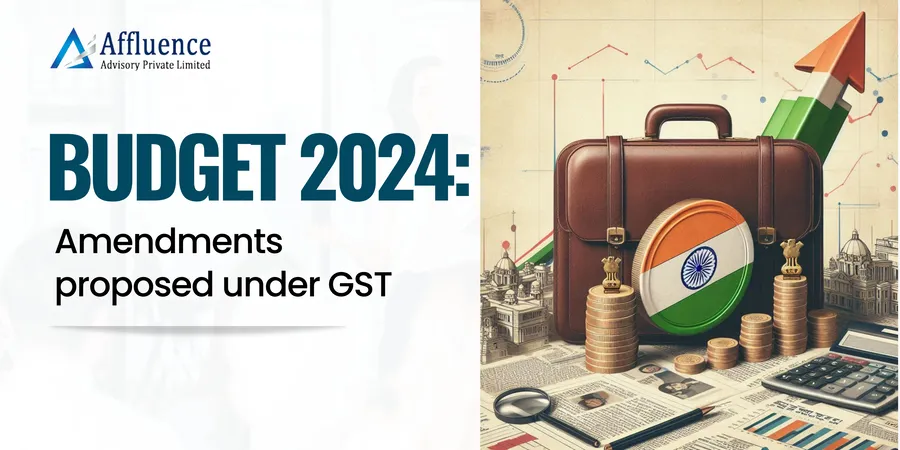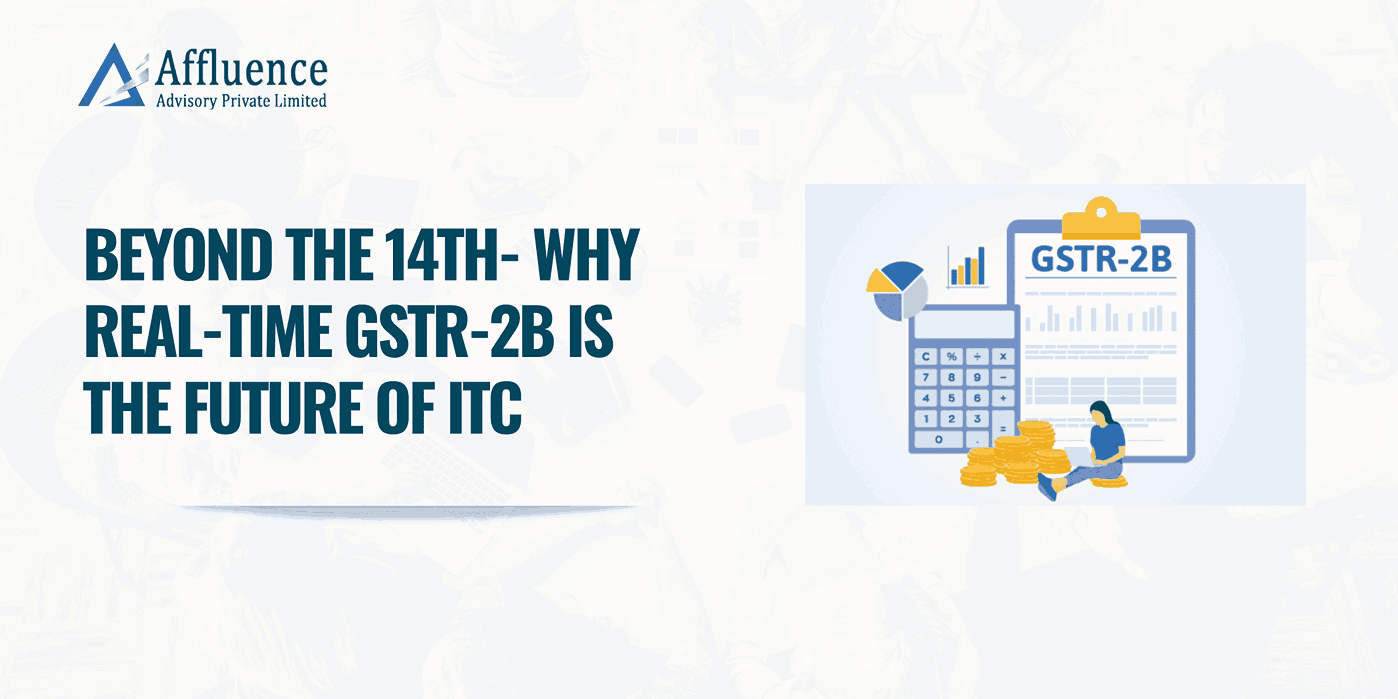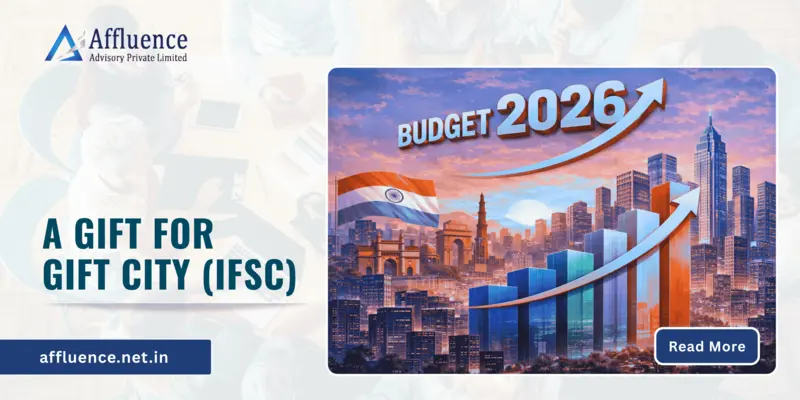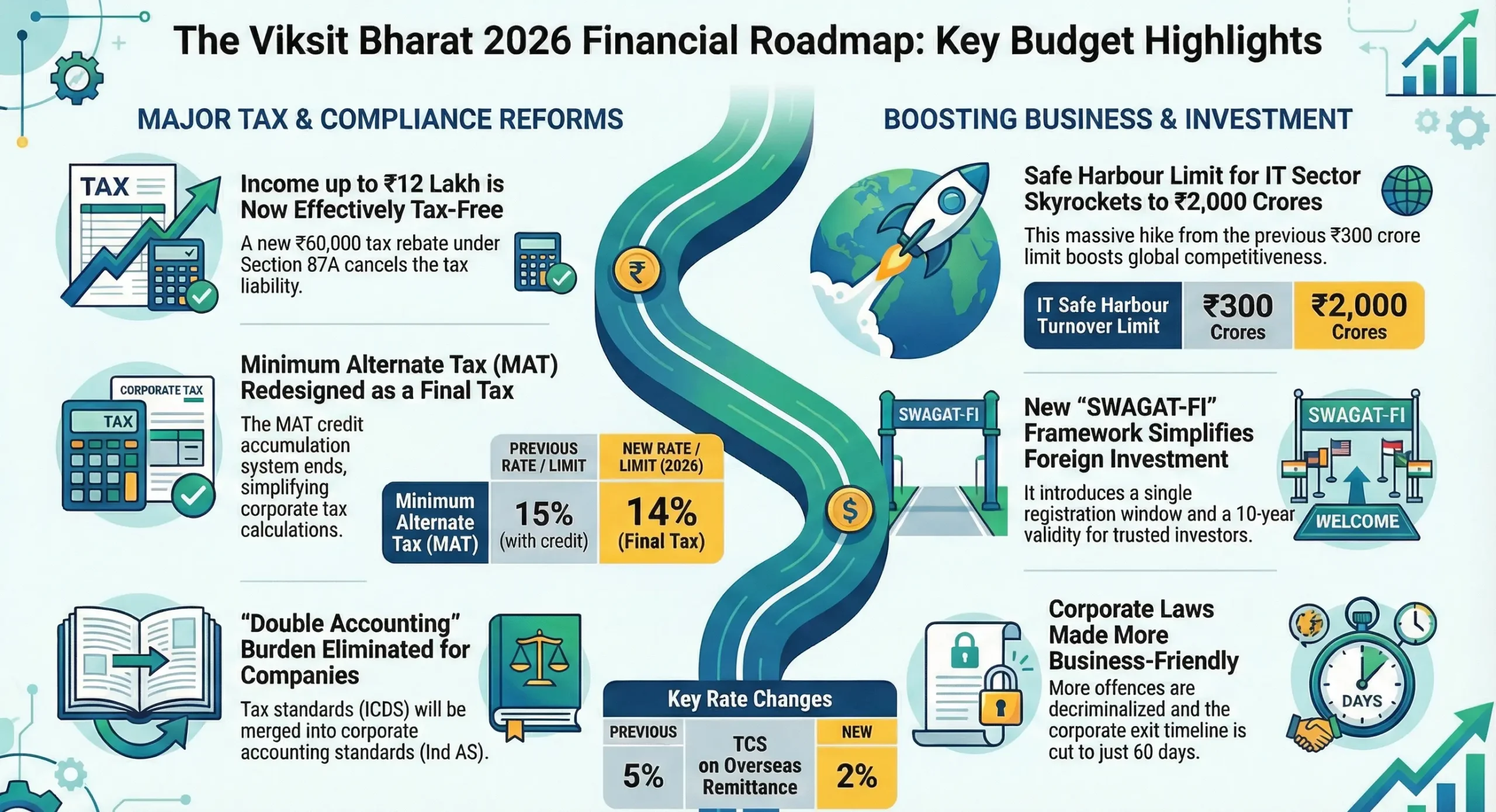Introduction:
In this publication, we made an attempt to extract the amendments proposed in the Budget 2024 related to GST and also simplify them for ease of understanding.
Amendments proposed in the CGST Act, 2017
The honorable Finance Minister has proposed the following amendments to the CGST Act vide The Budget 2024. The same are summarized below:
|
Section |
Amendment proposed |
Particulars |
Impact/Remarks |
|
Section 9 |
Addition of words in Sub-section (1) |
In lieu of the said amendment, GST shall not be levied on “Un-denatured extra neutral alcohol or rectified spirit used for manufacture of alcoholic liquor, for human consumption”. |
Similar amendment is proposed in Section 5(1) of IGST Act and Section 7(1) of UTGST Act |
|
Section 11A |
Insertion of a new Section |
Section 11A i.e. ‘Power not to recover GST not levied or short-levied as a result of general practice’. This non-obstante clause overrides the other provisions in the Act and provides that, if to the satisfaction of the Government that- (a) a prevailing practice regarding levy of central tax (including non-levy thereof) on any supply of goods or services or both; and (b) such supplies were, or are, liable to, – i. central tax, in cases where according to said practice, central tax was not or is not being levied, or
ii. a higher amount of central tax than what was, or is being levied in accordance with said practice
the Government may, on recommendation of GST Council, by notification, direct that the whole of the central tax payable on such supplies, or the central tax in excess of that was payable on such supplies, but for the said practice shall not be required to be paid in respect of supplies on which central tax was/is not levied, or was/is being short-levied in accordance with said practice. |
The similar provision been proposed to be inserted in Section 6A of IGST Act, section 8A of the UTGST Act and section 8A of the GST (Compensation to states) Act. This new provision would provide power to Central Government to exempt partially or absolutely any levy of tax in accordance with industry practice being followed. |
|
Section 13 |
Insertion in sub-section (3) |
In respect of supplies where tax is payable on reverse charge basis, the time of supply shall be earlier of:- a) Same
b) The date immediately following 60 days from the date of invoice or any other document, by the supplier in cases where invoice is required to be issued by the supplier; or
c) the date of issue of invoice by the recipient, where invoice is to be issued by the recipient; |
Amendment in clause (b) to cover the scenario where an invoice is issued by the supplier. Also, insertion of clause (c) to cover cases where self-invoice is generated. |
|
Section 16 |
Insertion of sub-section (5) and (6). The said insertion is to be considered from 1 July 2017 |
In light of new sub-section (5), the registered person shall be entitled to avail ITC in any GSTR-3B on invoices or debit note for supply of goods or services or both pertaining to FY 2017-18, 2018-19, 2019-20 and 2020-21, filed upto 30th November 2021. In light of new sub-section (6), in cases where the registration has been cancelled under Section 29 of the CGST Act and subsequently revoked either under Section 30 of CGST Act or pursuant to any Order made by the Appellation Authority or the Appellate Tribunal or court, and where availment of input tax credit in respect of an invoice or debit note was not restricted under sub-section (4) on the date of order of cancellation of registration, the said person shall be entitled to take the input tax credit in respect of such invoice or debit note for supply of goods or services or both, in GSTR-3B: i.filed upto 30 November following the financial year to which such invoice or debit note pertains or furnishing of the relevant annual return, whichever is earlier; or
ii.for the period from the date of cancellation of registration or the effective date of cancellation of registration, as the case may be, till the date of order of revocation of cancellation of registration, where such return is filed within thirty days from the date of order of revocation of cancellation of registration
Whichever is later. |
In case where registration is revoked under Section 30 of CGST Act, ITC can be claimed till 30 November following the end of FY. In case where revocation is in light of an adjudication proceeding, ITC can be claimed in GSTR-3B which is filed within 30 days of the said Order. |
|
Section 17 |
Substitution of words in sub-section(5)(i) |
ITC shall not be available in respect of any tax paid under Section 74 for any period up to Financial Year 2023-24. |
|
|
Section 30 |
Insertion of new proviso |
In light of the new proviso, Revocation of cancellation of registration shall be subject to such conditions and restrictions, as may be prescribed |
The conditions and restrictions for revocation will be notified by Government separately |
|
Section 31 |
Insertion of words in subsection(3)(f) & an explanation after clause (g) |
In light of amendment proposed in Section 31(3)(f), registered person liable to pay tax under Section 9(3) or 9(4), will be required to invoice within the period as may be prescribed. Further, in light of Explanation proposed to be added after clause Section 31(3)(g), for the purpose of Section 31(3)(f), the term supplier who is not registered would also include the supplier who is registered solely to deduct TDS under section 51 of the CGST Act. |
|
- Updates in the IGST Act, 2017
|
Section |
Amendment |
Particulars |
Impact/Remarks |
|
Section 16 (4) |
Amendment in clause (i) and (ii) and insertion of sub-section 5 |
In light of said proposed amendment, the words in accordance with provisions of Section 54 of CGST Act or rules have been added in clause (i) and (ii). Sub-section (5) provides that refund of unutilised ITC or IGST paid in case of export of goods shall not be allowed wherein such goods are subject to export duty. |
|
|
Section 20 |
Substitution of fifth proviso |
In light of the proposed amendment, the maximum limit for appeals to be filed before the Appellate Authority or the GSTAT, has been reduced to ₹40cr for each appeal {previously it was ₹50cr and ₹100 cr} |
|
- Amendment of Schedule III
In Schedule III to CGST Act, after paragraph 8 and before explanation 1, the following paragraphs shall be inserted namely:
9. Activity of apportionment of co-insurance premium by the lead insurer to the co-insurer for the insurance services jointly supplied by the lead insurer and the co-insurer to the insured in coinsurance agreements, subject to the condition that the lead insurer pays the central tax, the State tax, the Union territory tax and the integrated tax on the entire amount of premium paid by the insured.
10. Services by insurer to the reinsurer for which ceding commission or the reinsurance commission is deducted from reinsurance premium paid by the insurer to the reinsurer, subject to the condition that the central tax, the State tax, the Union territory tax, and the integrated tax is paid by the reinsurer on the gross reinsurance premium payable by the insurer to the reinsurer, inclusive of the said ceding commission or the reinsurance commission.
Comments:
In light of the above-proposed amendment in Schedule III to the CGST Act, the ambiguity with respect to the taxability of co-insurer share of premium and the taxability of ceding or reinsurance commission has been put to rest. The same shall not be considered as a supply of service.
Conclusion:
While these amendments are in light of the 53rd GST Council meeting, it would be worthwhile to understand and evaluate the implication of a few key amendments such as the removal of the definition of ‘suppression’ from Section 73 or Section 74 of the CGST Act, Issuance of notice under Section 73 or Section 74, Implications on adjudication proceedings in light of Section 74A, Waiver of interest and penalty in case of notice/statement issued under Section 73, etc. We would be glad to discuss or take you through any point which requires detailed understanding or clarification.
Disclaimer: This article provides general information existing at the time of preparation and we take no responsibility to update it with the subsequent changes in the law. The article is intended as a news update and Affluence Advisory neither assumes nor accepts any responsibility for any loss arising to any person acting or refraining from acting as a result of any material contained in this article. It is recommended that professional advice be taken based on specific facts and circumstances. This article does not substitute the need to refer to the original pronouncement
CLICK HERE DOWNLOAD PDF










